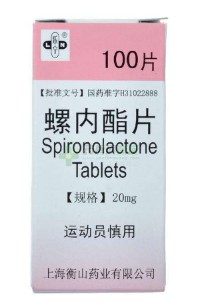
On this blog, I have often discussed the only two (Finasteride and Minoxidil) FDA approved drugs to treat hair loss. Finasteride is an oral drug that inhibits the enzyme 5α-reductase, which in effect then reduces the harmful-to-hair dihydrotestosterone (DHT).
Minoxidil is an antihypertensive medication that also happens to benefit scalp hair when used topically. This post covers a hair growth medication called Spironolactone (brand names Aldactone or Carospir).
Update: March 9, 2023 — A systemic review of the efficacy and safety of oral and topical Spironolactone in the treatment of androgenetic alopecia.
Anti-Androgens
When it comes to hair loss medications, one area that I have neglected is anti-androgens such as Spironolactone, which have many favorable reviews. I did discuss RU-58841 in one post at the start of this year. However, there are numerous other anti-androgens out there, such as Fluridil and Flutamide.
In general, the potential side effects from anti-androgens are more severe than from Finasteride and Minoxidil. Moreover, scalp hair regrowth is typically more significant with Finasteride and Dutasteride.
Note that while some strict definitions consider Finasteride to also be an anti-androgen due to its inhibition of DHT, I only consider drugs that inhibit the binding of testosterone to androgen receptors as being anti-androgens. Finasteride, while reducing DHT, actually raises testosterone levels by around 10 percent. Also worth noting is that the popular Nizoral shampoo might have some anti-androgenic properties per several recent studies.
In this post I will discuss the most popular “true” anti-androgen in the world: Spironolactone.
Spironolactone for Hair Loss
Spironolactone (generally sold under the brand name Aldactone) is also referred to as “Spiro” and is a synthetic drug available via prescription. It belongs to a class of drugs known as potassium-sparing diuretics, and is used primarily as a diuretic and antihypertensive in the treatment of heart failure and hypertension.
However, secondary anti-androgenic applications have become more prevalent in recent decades. Spironolactone can stop hair loss, reduce body hair (hirsutism), reduce acne, help women with polycystic ovary syndrome (PCOS) and improve seborrheic dermatitis.
In 2020, a study found topical Spironolactone 1% gel and Minoxidil 5% gel to be an effective combination treatment for hair loss. An older study from 1998 concluded that topical Spironolactone inhibits dihydrotestosterone receptors in human sebaceous glands
Spironolactone Side Effects
While this drug may seem like a miracle product that can kill many birds with one stone, potential side effects are significant and plentiful. For men, feminization is a real danger when taking Spironolatone, meaning that you can developed gynecomastia (larger breasts) and see your testicles shrink. Men can also develop premature ejaculation and become infertile (although in most cases it seems like this side effect is not permanent) when taking this drug.
Less traumatic side effects include drowsiness, dry skin, excess urination, headache, nausea and vomiting. Spiro can potentially even lead to death from severe allergic reactions, hyperkalemia, kidney failure and more, although I have not read about this happening to any hair loss forum members. In general, the doses that hair loss patients take tend to be on the lower side.
You can learn a lot more about Spiro and its use to treat hair loss by tracking patients that take this product and post about it in the various online hair loss forums. I have never tried to take Spironolactone since I am very cautious when it comes to taking any kind of drug.
Mechanism of Action
Aldactone (Spironolactone) is a specific pharmacologic antagonist of aldosterone. It primarily acts through competitive binding of receptors at the aldosterone dependent sodium-potassium exchange site. Aldactone causes an increase in sodium and water excretion rates, while potassium is retained. The drug therefore acts as both a diuretic as well as an antihypertensive via this dual mechanism.
Spironolatone for Male-To-Female Transsexuals
I first learnt about Spironolactone when I read testimonials and forum posts from numerous male-to-female (MTF) transsexuals out of my own curiosity many year ago. It seems like estrogen and Spiro are the two main drugs that MTF transsexuals are almost always given.
Moreover, transsexuals often have to take a much higher dosage (100-200 mg per day to start, and considerably higher doses if ineffective) of Spiro compared to men or women who are only tackling balding. It is therefore important for you to visit transsexual/transgender forums on the internet and ask questions if you ever intend to take Spiro.
